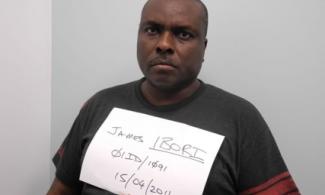
Amid apprehension by some Nigerians that the Goodluck Jonathan administration might negotiate with UK authorities over the fate of former Governor James Ibori of Delta State, a source at the British Home Office told SaharaReporters today that the idea of repatriating Mr. Ibori to serve his sentence in Nigeria “is absolutely out of the question.”
Amid apprehension by some Nigerians that the Goodluck Jonathan administration might negotiate with UK authorities over the fate of former Governor James Ibori of Delta State, a source at the British Home Office told SaharaReporters today that the idea of repatriating Mr. Ibori to serve his sentence in Nigeria “is absolutely out of the question.”
googletag.cmd.push(function() { googletag.display('content1'); });
On Monday, former Governor Ibori appeared before the Southwark Crown Court in London and pleaded guilty to money laundering and conspiracy charges. He is due to be sentenced on April 16 and 17th.
Confronted with the prospect of spending at least twenty years in prison had he chosen to go through a drawn-out trial, Mr. Ibori decided to plead guilty to embezzling billions of naira in public funds and using the looted funds to finance a splurgy lifestyle that included the acquisition of airplanes, choice real estate in Britain and other parts of the world, and a collection of expensive cars, including Bentleys.
Following Mr. Ibori's guilty plea, speculations made the rounds among some Nigerian groups that the government of Mr. Jonathan was about to negotiate the transfer of the embattled former governor to serve his sentence in Nigeria.
googletag.cmd.push(function() { googletag.display('content2'); });
“I don’t believe there is any discussion in that direction between Nigeria and the UK,” said the source at the British Home Office. “And the UK would not agree to such an extraordinary arrangement,” he added. Our sources stated that the UK government would be reluctant to hand Ibori over to the Nigerian government under any circumstances. He said the UK had spent a lot of money to prosecute Ibori to make an example of him. “It would amount to a sham judicial maneuver to send him away to Nigeria now that we have secured conviction,” said the source.
A source with the Crown Prosection Service also reiterated the same point. “Mr. Ibori was tried in Nigeria and freed. Why would we return him to Nigeria? The only point would be to allow him to continue the life of luxury he denied his own people, but that’s not a goal we’re likely to encourage.”
A Nigerian judge, Marcel Awokulehin, had cleared Ibori of a 170-count indictment after a stage-managed trial. Several sources close to Ibori had told SaharaReporters that Justice Awokulehin received an inducement of $5 million to free the former governor.
Mr. Ibori’s sentencing hearing will last two days. UK sentencing procedures allow the judge in the case to offer Mr. Ibori credit for the time he spent in detention in the United Arab Emirates and London before his trial.
SaharaReporters has learned that British prosecutors would likely ask the judge to sentence Ibori to between 12 and 14 years in prison. “That means he’s likely to spend at least 10 years in prison in the UK,” a UK-based Nigerian lawyer told SaharaReporters. Upon completion of his prison term, officials said he would certainly be deported to Nigeria. Mr. Ibori owns extensive assets in Nigeria as well as South Africa and possibly Ghana.
The Economic and Financial Crimes Commission (EFCC) yesterday said the agency would still try Ibori for money laundering crimes he committed while in office.
Before pleading guilty, Mr. Ibori characteristically planted stories in Nigerian newspapers claiming that the UK Crown Prosecution Service was "plea bargaining" with him, a term our source described as a ruse.
In the past, the former governor had used such media manipulations to spin and confuse the real story behind his extensive money laundering activities. In one such deceptive schemes, Ibori used a London-based Nigerian blogger, Daniel Elombah, to publish highly distorted favorable accounts of the progress of his trial. Mr. Elombah, who had previously set up an anti-corruption page on Facebook, wrote fictitious reports to the effect that the case against Ibori was near collapse. His reports appeared after he had bragged openly on listservs that he had met Ibori’s lawyers who promised to provide earthshaking information about the impropriety of the London MET police officers who investigated the rogue former governor. Mr. Elombah’s blog falsely accused the MET police officers of receiving bribes from Ibori.
Rather than serve Ibori, the desperate media tactics worked against him, SaharaReporters was told. For example, his sponsorship of a petition claiming that Metropolitan police investigators accepted a bribe from him was treated as admission by him that he wanted to thwart justice in the UK in much the same way as he did in Nigeria. UK authorities discarded the petition which contained a fake name and address.
googletag.cmd.push(function() { googletag.display('comments'); });